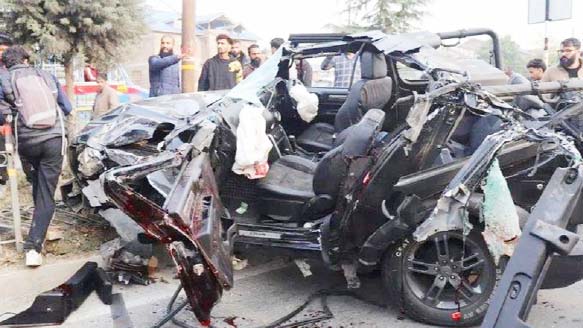Bhumesh Sharma
Every year, the third Sunday of November is observed worldwide as the World Day of Remembrance for Road Accident Victims. This solemn day serves as an opportunity to draw attention to the devastating consequences of accidents/crashes, to highlight the significant costs of these tragedies, and to emphasize the critical measures that can be taken to prevent them. It is a day of solidarity, remembrance, and reflection-a day dedicated to all the lives lost on the roads and the enduring suffering of their families and communities.
However, despite the global recognition of this day, Jammu and Kashmir remains a notable exception, as no such commemoration has yet been observed in the region. This oversight is not just a gap in the calendar-it reflects a troubling social indifference toward the victims of road accidents, whose lives and legacies are too often forgotten. In a region where road accidents are increasingly common, this day of remembrance is not just important; it is urgently needed.
While the nation greets the New Year with joy, exchanging gifts and celebrating with loved ones, the families who have lost their dear ones in road crashes are left in the shadows, their grief unnoticed. The World Day of Remembrance offers an opportunity to acknowledge their pain, offer them solidarity, and call on the authorities to take meaningful action toward making our roads safer. Unfortunately, in Jammu and Kashmir, despite the rising toll of road fatalities, there is no official recognition of this day, and no organized effort to address the underlying issues or offer support to the bereaved.
Each year, the roads of Jammu and Kashmir claim the lives of hundreds. In 2023 alone, approximately 1,000 people lost their lives in road accidents, a staggering statistic that reflects only the reported fatalities. Many more are severely injured, and countless families are left devastated. These tragedies are not just numbers; they represent the loss of fathers, mothers, sons, daughters, and breadwinners, often young and healthy individuals in the prime of their lives. In rural areas like Ramban, Doda, and Kishtwar, it is rare to find someone who hasn’t personally been affected by such a loss. The impact is felt not only by the immediate families but also by entire communities that are forced to cope with the aftermath of these preventable tragedies.
The alarming statistics released by the Jammu and Kashmir Traffic Police paint a grim picture. In 2024, up until September, the region witnessed 4,457 accidents, resulting in 621 fatalities and 6,122 injuries. It is important to note, however, that these numbers only account for deaths that occurred at the scene of the crash. The true toll is likely much higher, as many individuals succumb to their injuries in hospitals, with their deaths never officially recorded in these statistics.
Each road crash leaves behind shattered families and communities, and while the physical evidence of accidents is cleared from the streets, the emotional scars remain. Victims’ families, who often feel forgotten by the justice system, the authorities, and society at large, struggle in silence. These families deserve not only our empathy but also our action. The World Day of Remembrance is an opportunity to remind society of the human cost of road traffic accidents and to push for meaningful change.
We must recognize that road traffic fatalities represent one of the largest human-made disasters in terms of both losses of life and economic cost. The day of remembrance underscores that this toll is unacceptable and that road safety is not just a matter of individual responsibility but of collective action. This day is a chance for the bereaved to share their grief, to honour the lives lost, and to raise awareness about the urgent need for improved road safety measures.
In many countries, World Day of Remembrance serves as a platform for public education, research, and policy discussions on road safety. Seminars and awareness campaigns are organized to discuss key issues such as trauma care, bereavement support, and the investigation of road accidents. It also provides an opportunity to promote better enforcement of road safety laws and to encourage individuals to make a commitment to safer driving habits. In Jammu and Kashmir, we too must embrace this opportunity to improve road safety, support the bereaved, and push for stronger political commitment to address this crisis.
It is crucial that the government of Jammu and Kashmir prioritize road safety as a key policy issue. Efforts must be made to promote safe driving habits, enforce traffic regulations, and provide comprehensive support to victims and their families. The World Day of Remembrance could play a pivotal role in fostering greater awareness and political commitment toward reducing road accidents in the region. From organizing awareness campaigns to providing counselling and rehabilitative services to accident victims, there are numerous ways we can show our solidarity with the bereaved. We must also recognize that road traffic accidents are preventable. Many countries have achieved remarkable reductions in road fatalities by implementing effective countermeasures, such as stricter laws, better road infrastructure, and public education campaigns. By adopting these best practices and adapting them to our local context, we can take concrete steps toward making Jammu and Kashmir’s roads safer for all.
As we step into the new year, let us make a collective resolution to observe the World Day of Remembrance for Road Traffic Victims in Jammu and Kashmir. Let this be the year when we honour the memory of those lost on our roads, support their families, and take action to prevent further tragedies. By adhering to traffic rules, advocating for better road safety policies, and observing this day of remembrance, we can work together to make Jammu and Kashmir an accident-free region-a place where every life is valued, and every road user is safe.
Trending Now
E-Paper


